
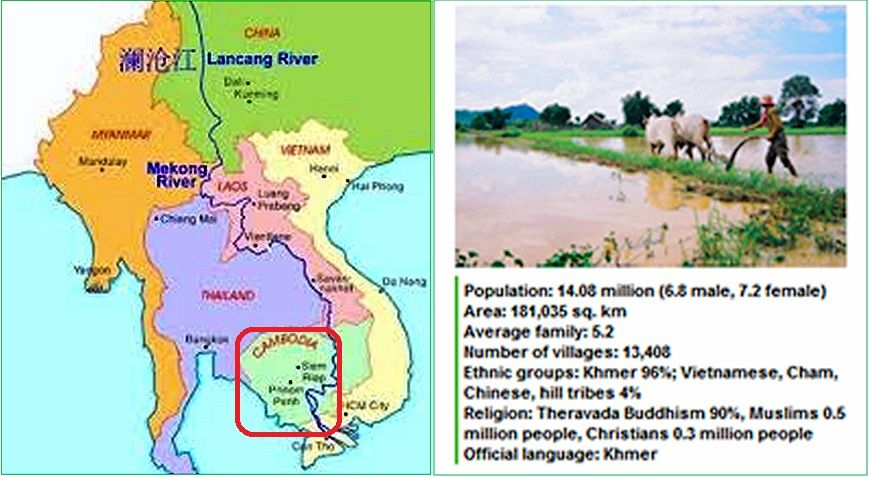 The Pope's videomessage
The Pope's videomessage
to the Church in Cambodia:
'Proclaim Christ to the world'

January 7, 2013
Pope Benedict XVI on Monday delivered a video message to the faithful in Cambodia, at the end of a special national congress to celebrate the 50th anniversary of Vatican II and the 20th anniversary of the Catechism of the Catholic Church.
The Holy Father expressed his hope “that the Cambodian language translation of the conciliar documents and the Catechism that you will receive on this occasion will allow you to better understand the teaching of the Church and grow in faith.”.
He called on Cambodian Catholics to focus on the person of Jesus Christ, and to continue to proclaim the Good News to the modern world.
Recalling the troubling history of Cambodia’s recent past, Pope Benedict said, “I would like to emphasize the faith, courage and perseverance of your pastors and of your Christian brothers and sisters, those so many who have died, is a noble testimony to the truth of the Gospel.”
Here is the Vatican's English translation of the message which was delivered in French:
Dear Brothers and Sisters in Cambodia,
It is with great pleasure that I join you in prayer these days and through the heart, send you warm greetings while you gather around your pastors to celebrate the fiftieth anniversary of the opening of the Second Vatican Council and the twentieth anniversary of the Catechism of the Catholic Church.
I hope that the Cambodian language translation of the conciliar documents and the Catechism that you will receive on this occasion will allow you to better understand the teaching of the Church and grow in faith.
In this Year of Faith, I invite you to keep your eyes fixed on the person of Jesus Christ who is the origin and end of our faith (cf. Heb 12: 2) and to reiterate the Good News to the world today.
In Him, the examples of faith that have marked our history, find their full light. Also, remembering the period of troubles that precipitated your country in the darkness, I would like to emphasize the faith, courage and perseverance of your pastors and of your Christian brothers and sisters, those so many who have died, is a noble testimony to the truth of the Gospel.
And this testimony has become a priceless spiritual strength to rebuild the church community in your country. Today, many catechumens and adult baptisms show your dynamism and is a happy sign of the active presence of God in you.
Dear brothers and sisters, after the Apostle Paul, I urge you to "keep the unity of the Spirit by the bond of peace" (Eph 4, 3). Be assured of the prayers of your brothers and sisters whose blood flowed in the rice fields!
Be a leaven in the dough of your society, witnessing to the love of Christ for all, building bonds of brotherhood with members of other religious traditions, and walking on the paths of justice and mercy.
Dear young people, my friends who have been baptized in these recent years, do not forget that the Church is your family; she is counting on you to witness the life and the love that you have found in Jesus.
I pray for you and I invite you to be generous disciples of Christ.
Cambodian seminarians, priests and religious, you are a sign of the seeds of the Church that is building up herself. You have offered your life and your prayers are a source of hope. May they be also an invitation to other young people to give their lives as priests and religious in the heart of God.
Missionaries, religious, consecrated laity from five continents, be the beautiful sign of ecclesial communion around your pastors so that your brotherhood in the diversity of your charismas may lead many people you serve and love with zeal to meet Jesus Christ.
And all of you, who seek God, persevere and be sure that Christ loves you and offers you His peace!
Beloved brothers and sisters, pastors and faithful of Cambodia, the Virgin Mary, Our Lady of the Mekong, in her humility and fidelity to the will of the Lord, enlighten you throughout this Year of Faith. Be sure that I keep you in my prayers and in the bottom of my heart I convey you all an affectionate Apostolic Blessing!
Here is some background on Cambodia from the excellent website of the Apostolic Prefecture of Battambang (which includes Siem Reap, Cambodia's second largest city after Phnom Penh, and which is near the monumental Hindu temple complex of Angkor Wat):

Since 1969, Cambodia has suffered a number of conflicts which have severely affected its infrastructure and its natural resources. It was only in December 1998 that the Khmer Rouge factions laid down their weapons.
While Cambodia has begun to rebuild itself, the task may take generations. Peace remains a challenge, but at least the systematic violence of armed factions has been relegated to history.
Today it is estimated that 36% of Cambodia's people live below the poverty line. The poverty rate is particularly high in rural areas and rural households, 84%, especially those for whom agriculture is the primary source of income.
The principal factor leading to poverty is lack of access to land because the Khmer Rouge destroyed all the land titles. In areas that are mined, land is not worth anything and it is occupied by people who are very poor. Due to the landmines and of the years without vaccinations against polio, there is a high number of people with disabilities in the region.
When big investors come, no one protects the property and interests of small farmers. Landless families are effectively forced to migrate to other areas, whilst young people also drift into the city in search of education or work. As a result, many end up in garment factories, where they earn a pittance, and girls may be drawn into the city's booming sex trade.
Tourism is a growing area that opens up Cambodia to the world. It is a source of income for the Cambodians and transmits the cultural richness of the country. But tourism also brings about risks: human trafficking, prostitution, lack of transparency or corruption and HIV-AIDS infections.
Children below 18 years of age represent about 50% of the total population. Only 33% of 12 year-olds complete the sixth grade. Many students do not have enough supplies for school; there is an abundance of unqualified teachers, and the teachers are paid very poorly in most places.
About the Cambodian martyrs cited by the Holy Father:
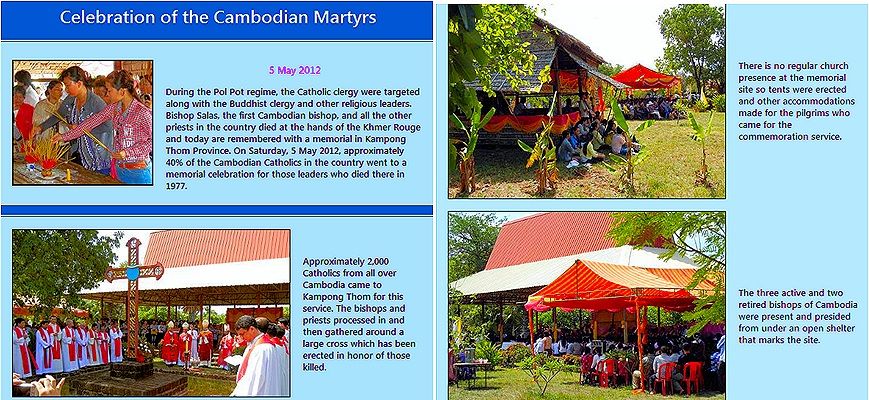
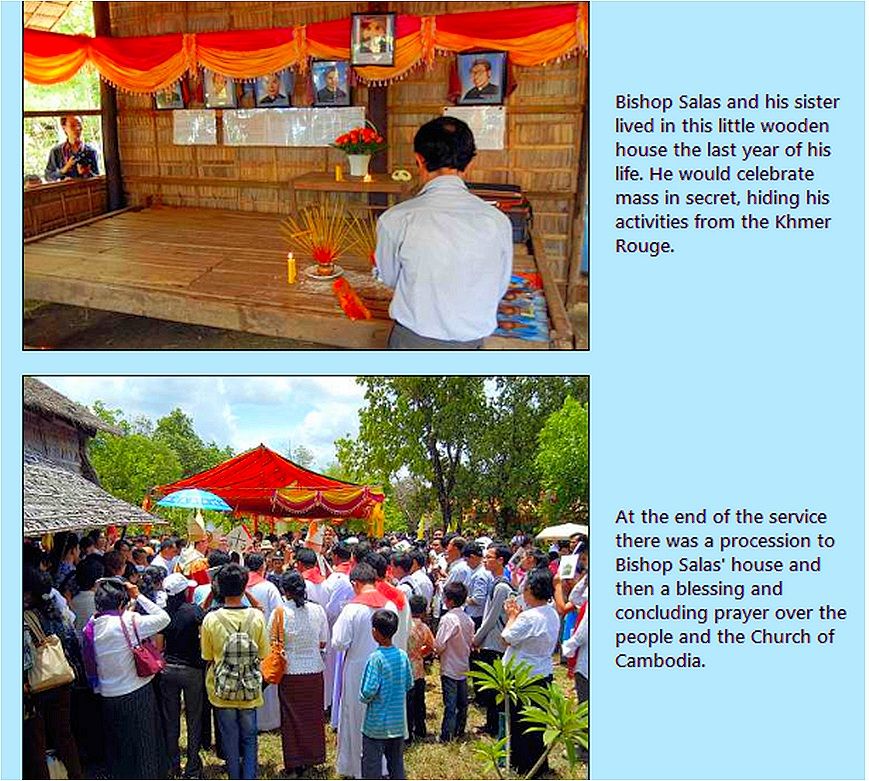
The Catechism in Cambodian:
A gift for the Year of Faith

Phnom Penh, Jan. 7 (Agenzia Fides) - The Catechism of the Catholic Church has been translated into Khmer (the Cambodian language) and "will be a valuable tool for all communities and associations of the faithful to deepen their understanding of the 'Creed' and of Catholic doctrine, in the Year of Faith", the Apostolic Vicar of Phnom Penh, Mons. Olivier Schmitthaeusler, MEP, told Fides at the conclusion of the Congress organized by the Apostolic Vicariate on "The Second Vatican Council and the Church."
The participants of the Congress, which ended today, listened to a video message sent by the Holy Father Benedict XVI to encourage Christians in Cambodia so "they feel they are truly part of the universal Church," the postolic Vicar said.
Also translated on the occasion of the Congress were the documents of Vatican II translated into Khmer - as "a resource for meditation, deepening and study" that will help one to understand how the Khmer Church is part of the post-conciliar dynamic.
The Apostolic Vicar said that the local community has chosen, in particular, this year to reflect on the document
Lumen Gentium, about "the Church as the People of God, the faithful called to holiness."
The Catechism in Khmer will be a valuable tool for evangelization. The bishop said that the Cambodian Church, which represents 1% of the population in a country where 96% are Buddhist, "is experiencing again the time of the Acts of the Apostles, with a first proclamation of the Good News" and is "a laboratory of evangelization in a Buddhist world."
Suring the Congress, the Vicar stressed the two significant points for the new evangelization, referring to the situation of the Church in Cambodia, persecuted at the time of the Khmer Rouge: forgiveness and commitment of the laity.
"The real encounter with Jesus Christ," he said, "opens the heart to love and experience of forgiveness, to lead to the discovery of the gift of life," and "the laity are the apostles of this announcement", he said.
I always welcome it when a papal event or message draws attention to a local Church about which we know little, as an opportunity to learn something about it, and what good fortune, in the case of the Church in Cambodia, to find the site of the Apostolic Prefecture of Battambang online, www.battambang.net/index.html, which is a model of excellence for a pastoral site, as you can see from the items I have lifted from it, and for a website, in general, from the point of view of presentation in clear straightforward and good English and in its graphics, as you can see from the following composite:
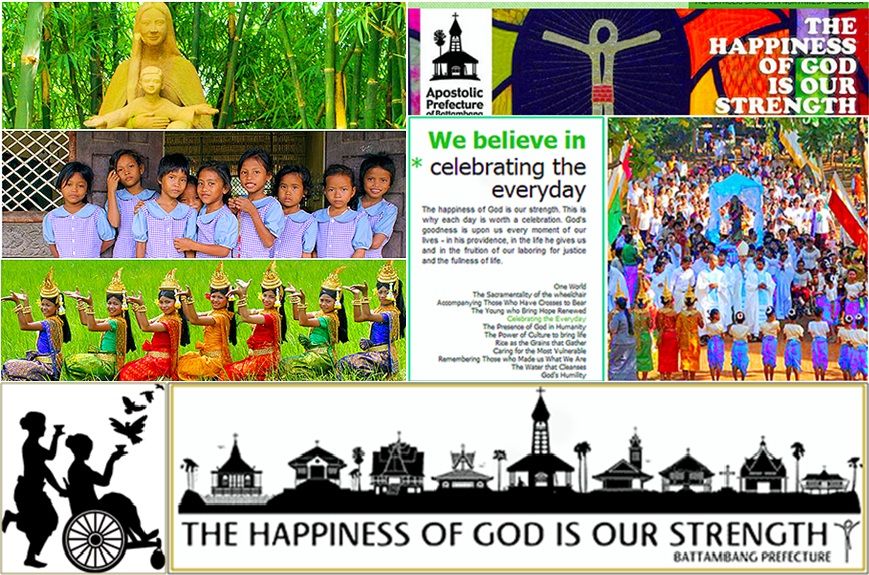 Don't you love the little vignette on the left with the doves seeming to fly out of the oil lamp in the lady's hand?
And I cannot pass up this opportunity to call attention to Angkor Wat, said to be the largest religious monument in the world,
Don't you love the little vignette on the left with the doves seeming to fly out of the oil lamp in the lady's hand?
And I cannot pass up this opportunity to call attention to Angkor Wat, said to be the largest religious monument in the world,
and Cambodia's enduring cultural legacy to mankind.
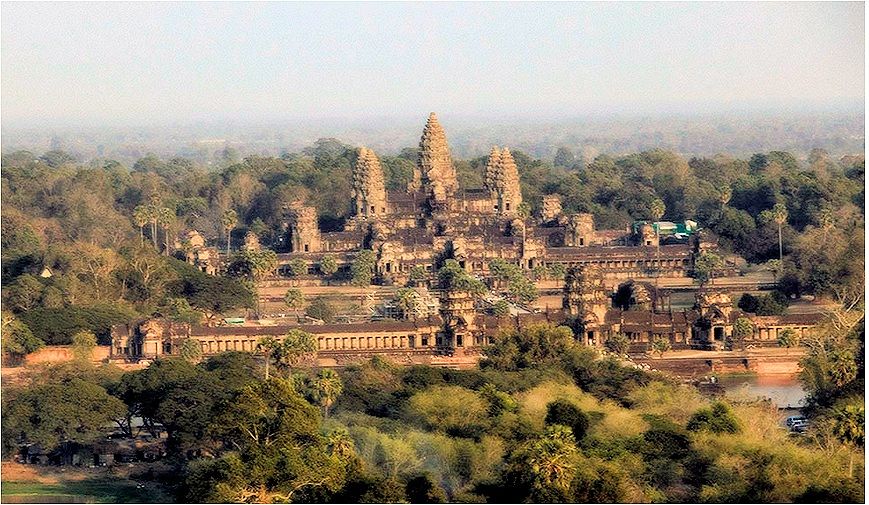 Built in the 12th century at the height of the Hindu Khmer Empire as a temple for Vishnu, Angkor Wat (Temple City) eventually became a Buddhist shrine by the end of the 13th century, as Theravada Buddhism established its dominance in Cambodia and neighboring Thailand. A Portuguese monk, António da Madalena, who visited in 1586, wrote that Angkor Wat "is of such extraordinary construction that it is not possible to describe it with a pen, particularly since it is like no other building in the world. It has towers and decoration and all the refinements which the human genius can conceive of" - architecture and adornments which another Western writer has described as the work of an oriental Michelangelo.
Built in the 12th century at the height of the Hindu Khmer Empire as a temple for Vishnu, Angkor Wat (Temple City) eventually became a Buddhist shrine by the end of the 13th century, as Theravada Buddhism established its dominance in Cambodia and neighboring Thailand. A Portuguese monk, António da Madalena, who visited in 1586, wrote that Angkor Wat "is of such extraordinary construction that it is not possible to describe it with a pen, particularly since it is like no other building in the world. It has towers and decoration and all the refinements which the human genius can conceive of" - architecture and adornments which another Western writer has described as the work of an oriental Michelangelo.
Along with the equally monumental 9th century Mahayana Buddhist temple complex in Borobudur, Indonesia, and the 6th-10th century golden pagoda of Shwe Dagon in Rangoon, Burma, Angkor Wat ranks with the great cathedrals of Europe as examples of religious inspiration translated into lasting symbolic beauty, and of extraordinary architectural and artistic achievements by the peoples of Southeast Asia, unrivalled in scale and magnificence anywhere else on the continent. (The remarkable thing is that Angkor Wat is surrounded by numerous lesser temples built in the late Middle Ages that have survived very well to this day, despite the ever-present threat of encroachment from surrounding jungle).
[Modificato da TERESA BENEDETTA 08/01/2013 20:23]